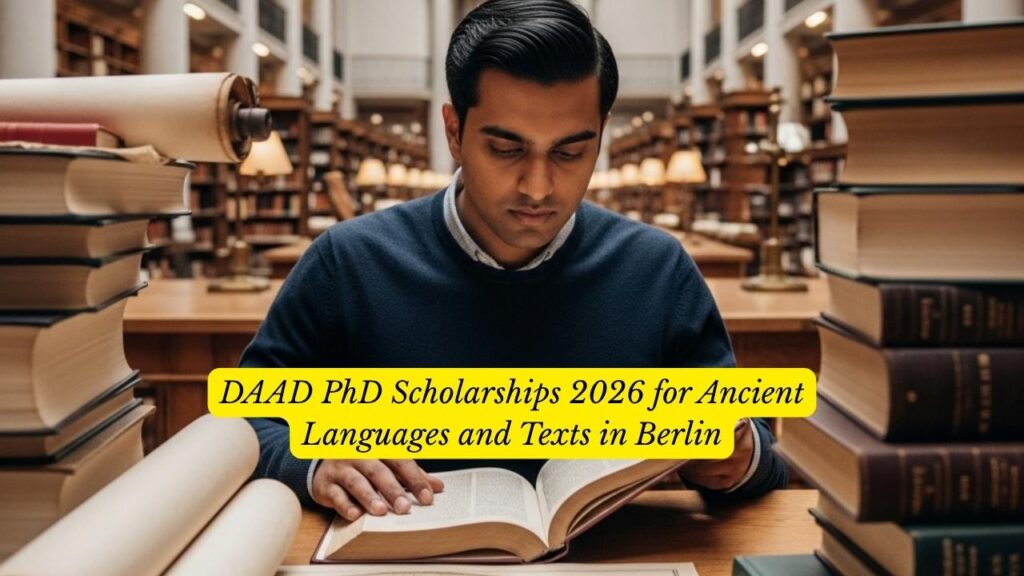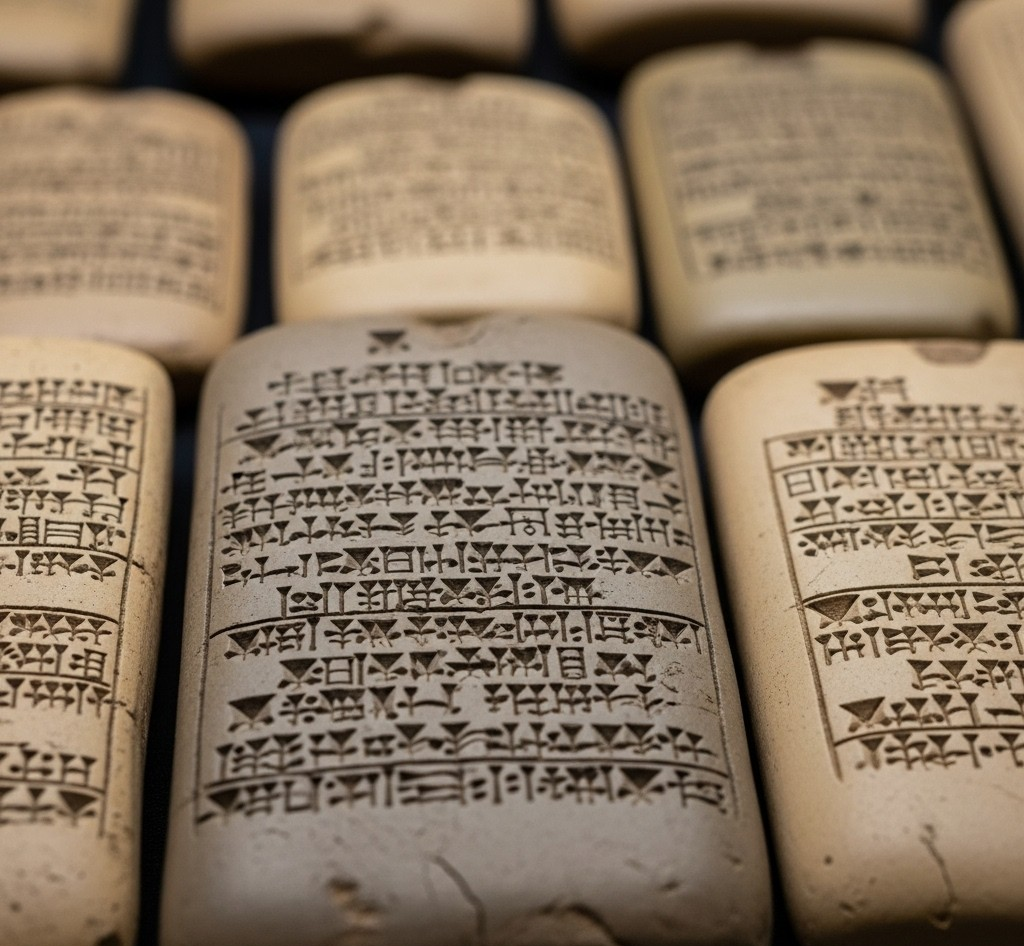Are you captivated by the whispers of ancient civilizations, eager to decipher forgotten scripts, and dedicated to bringing the past to life through rigorous scholarship? If so, the DAAD PhD Scholarships 2026 for the “Ancient Languages and Texts” program in Berlin might be your gateway to an unparalleled academic journey. This fully funded opportunity in Germany is a dream for aspiring philologists, historians, and researchers of the ancient world.

Embarking on a PhD is a significant undertaking, and securing funding is often a primary concern. That’s where the German Academic Exchange Service (DAAD) steps in, offering prestigious scholarships that empower talented international students to pursue their research in Germany’s world-class universities. I’ve seen many successful applicants navigate this process, and a key factor is a clear understanding of the program and a meticulously prepared application. This article will guide you through the essentials, helping you confidently pursue your goal of studying ancient languages and texts in the vibrant academic hub of Berlin.
The Allure of Ancient Languages and Texts in Berlin
Berlin, a city rich in history and culture, is home to leading institutions like Humboldt-Universität zu Berlin and Freie Universität Berlin, which are central to the “Ancient Languages and Texts” (ALT) doctoral program. This program, offered through the Berlin Graduate School of Ancient Studies (BerGSAS), delves into the written heritage of ancient cultures, from literary masterpieces to documentary texts like inscriptions and papyri. It’s an interdisciplinary journey that combines traditional philological methods with historical and cultural inquiries, even incorporating modern literary studies, linguistics, and the digital humanities.
DAAD PhD Scholarships 2026 for Ancient Languages and Texts in Berlin
| Key Fact | Detail/Statistic |
| Program Title | “Ancient Languages and Texts” (ALT) Doctoral Program Humboldt-Universität zu Berlin – DAAD |
| Host Institutions | Humboldt-Universität zu Berlin & Freie Universität Berlin (via BerGSAS) |
| Application Deadline | October 15, 2025 (00:00 CEWT) |
| Scholarship Duration | Four years (October 2026 – September 2030) |
| Monthly Stipend | €1,300, DAAD – Doctoral Programmes in Germany |
| Eligibility | Non-German citizens, no prior PhD, Master’s degree obtained after March 1, 2020, limited residency in Germany |
The DAAD PhD Scholarships 2026 for the “Ancient Languages and Texts” program in Berlin represent an exceptional opportunity for dedicated scholars. It’s a chance to deepen your understanding of the past, contribute original research to your field, and build an international academic network in one of Europe’s most dynamic cities.
Understanding the Program: Ancient Languages and Texts
The “Ancient Languages and Texts” program offers a rich environment for doctoral research. It encourages a wide understanding of “a text” and a plurality of research methods, combining traditional philological techniques with contemporary historical and cultural questions. This means your research could involve anything from analyzing classical Greek poetry to deciphering ancient Egyptian papyri, or even exploring the interaction between texts and pictorial representations.
The program places particular emphasis on theories and approaches from modern literary studies and linguistics, and actively integrates topics and methods from the digital humanities and computer philology. This forward-thinking approach ensures that your research is not only deeply rooted in tradition but also relevant to contemporary scholarship. Doctoral students are expected to participate in Digital Humanities training offered by BerGSAS, further enhancing their skills.

Navigating the Application Process for DAAD PhD Scholarships 2026
The application for the DAAD PhD Scholarships 2026 for Ancient Languages and Texts is a two-stage process, managed primarily through the BerGSAS application portal. It’s crucial to be meticulous and submit all required documents by the deadline.
Eligibility Criteria: Are You a Fit?
To be considered for these highly competitive scholarships, you must meet specific criteria:
- Nationality: You must not be a German citizen.
- Prior PhD: You must not have completed a PhD previously.
- Master’s Degree: Your Master’s degree must have been obtained no earlier than March 1, 2020.5Ideally, it should be an excellent Master’s degree (MA, MSt, or MSc) in one of the relevant disciplines (e.g., Ancient History, Ancient Oriental Languages, Greek and Latin Philology, Egyptology, Iranian Studies, Jewish Studies, Protestant Theology with a focus on Old Testament/Hebrew Bible and Septuagint, etc.). If you are close to completion, your Master’s thesis must have been submitted and already graded at the time of application.
- Residency in Germany: You must not have resided continuously in Germany before December 1, 2024.
- Language Proficiency: You will need to demonstrate sufficient command of English, typically at least B2 level for the DAAD, although Freie Universität may require C1 for admission to doctoral studies. Proof through IELTS Academic or TOEFL is generally accepted. Furthermore, applicants are expected to have sufficient command of the relevant ancient languages for their specific dissertation project.
Required Documents: Your Application Toolkit
A complete application is paramount. Here’s a comprehensive list of what you’ll need to prepare:
- Motivation Letter: This is your chance to shine! A compelling motivation letter (1-3 pages) explaining your academic and personal reasons for pursuing this specific program and why you are an excellent candidate. We’ll delve deeper into this shortly.
- Curriculum Vitae (CV): A detailed, tabular CV (max. 3 pages) outlining your academic and professional history.
- Certificates: Copies of your academic degree certificates (B.A. and M.A.), including grades and an explanation of your home university’s grading system.7 These do not need to be officially certified initially.
- Transcripts: Current overview of grades/transcript of records with individual grades.
- Research Exposé/Proposal: A detailed research proposal outlining your specific doctoral project. This should demonstrate originality, topicality, relevance, and your chosen host institution.
- Letters of Reference: Two letters of reference from university professors are required. One must be from a professor at your home university. These are confidential documents and should be sent directly as PDF files by the professors to the program coordinator (Dr. Carmen Marcks-Jacobs at [email protected]).
- Language Certificates: Proof of English language proficiency (e.g., IELTS Academic or TOEFL).
- Admission Letter (if applicable): While you may not have this at the time of initial application, you must submit proof of admission to doctoral studies at Humboldt-Universität zu Berlin or Freie Universität Berlin before the funding period begins.

Crafting a Winning Motivation Letter
Your motivation letter for the DAAD scholarship is arguably the second most important element after your academic grades. It’s where you articulate your passion, demonstrate your understanding of the “Ancient Languages and Texts” program, and convince the selection committee that you are the ideal candidate.
- Strong Introduction: Start by clearly introducing yourself, stating the specific scholarship and program you are applying for, and briefly outlining your passion for ancient languages and texts.
- Academic Journey & Fit: Connect your academic background, research experiences, and skills directly to the ALT program. Explain why this particular program in Berlin is the perfect fit for your research interests and career aspirations. Don’t just list your achievements; explain their significance and how they’ve prepared you for doctoral research in this field. For instance, you could mention: “Having spent years poring over Coptic manuscripts, I am particularly drawn to the BerGSAS program’s emphasis on combining traditional philology with digital humanities, a methodological approach I believe is critical for the future of ancient studies.”
- Research Proposal Alignment: Briefly articulate the core of your research proposal and how it aligns with the objectives and interdisciplinary nature of the ALT program. Showcase your original thinking and the relevance of your proposed project.
- Why Germany? Why DAAD? Explain your reasons for choosing Germany and the DAAD scholarship. Perhaps it’s Germany’s reputation for academic excellence in ancient studies, the specific resources available in Berlin, or the DAAD’s commitment to fostering international academic exchange.
The Selection Process and What to Expect
The application procedure involves two stages. First, you register on the BerGSAS application portal and upload your documents. Shortlisted candidates are then invited for an online interview. BerGSAS will nominate selected candidates to the DAAD, which makes the final selection. Keep in mind that admission to doctoral studies at the host university (Humboldt-Universität zu Berlin or Freie Universität Berlin) and the receipt of the scholarship are both subject to assessment by these institutions and the DAAD.
Beyond the Application: Life as a PhD Scholar in Berlin
Studying in Berlin as a DAAD scholar offers more than just academic rigor. You’ll be immersed in a vibrant, international city with a rich historical tapestry. The academic environment is stimulating, with opportunities for interdisciplinary collaboration and access to world-renowned libraries and archives. Learning German, while not always strictly required for English-taught programs, is highly beneficial for daily life and cultural integration.
The Gates Scholarship 2026 Spring Intake is Now Open: Your Path to Excellence Starts Here
Fully Funded PhD Scholarship 2026 at Berliner Antike Kolleg, Germany
FAQ
Q1: What specific ancient languages are covered in the “Ancient Languages and Texts” program?
The program focuses on the written heritage of ancient cultures, welcoming applicants from fields such as Ancient Oriental Languages, Ancient Philology (Greek, including Byzantine Greek, and Latin, including Classical, Middle, and Modern Latin), Egyptology (including Coptology), Iranian Studies, Jewish Studies, and Protestant Theology (with Old Testament/Hebrew Bible and Septuagint). Applicants are expected to have sufficient command of the relevant ancient languages for their dissertation project.
Q2: Is it mandatory to speak German to apply for this scholarship?
While the working languages for the program are German and English, the DAAD requires at least a B2 level in English for most scholarships. However, Freie Universität Berlin may require a C1 English certificate for doctoral admission. Learning German is highly recommended for daily life and integration into the academic and cultural environment, and the scholarship can even provide support for a pre-sessional German language course.
Q3: Can I apply if I recently completed my Master’s degree but haven’t received my official certificate yet?
Yes, if you are “very close to completion,” meaning your Master’s thesis has been submitted and already graded at the time of application, you may be eligible to apply. However, you will need to submit your official Master’s degree certificate before the funding period begins.










